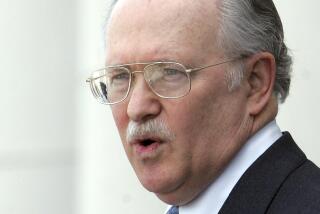Bioethicists Address ‘Deep Questions’
PHILADELPHIA — Early in his career, public debate over the moral dilemmas posed by scientific advances was so sparse that bioethicist Arthur L. Caplan went for years without a call from a reporter.
Now, as director of the Center for Bioethics at the University of Pennsylvania, Caplan does back-to-back telephone and TV interviews on the ethical tangles arising from this brave new world of genome mapping, cloning and stem cell research.
Caplan--one of the world’s foremost bioethicists, and one of the most widely quoted--was so busy one recent afternoon that he couldn’t get a break to discuss the booming field until most of the center emptied out for the day.
As he finished a telephone interview with “Good Morning America” on physicians diagnosing or treating patients over the Internet, a “Prime Time Live” crew was packing its gear after taping a segment on human experimentation. Before that, the Nickelodeon children’s network had set up cameras in the office for an interview on stem cells.
“Bioethics probably has topped the chart of its visibility when the president makes his first speech on bioethics and appoints his bioethics advisor,” Caplan said. “I guess that’s bigger than I would have guessed we would get.”
Widespread public discussion of the ethics of science was largely unheard of a quarter-century ago, until the New Jersey Supreme Court ruled in the nation’s first major right-to-die case in 1976 that Karen Ann Quinlan’s parents had the right to remove her from life support.
“That issue brought bioethics into the American consciousness,” Caplan said.
Until then, the moral implications of such decisions had mainly been debated in think tanks, said Caplan, who at the time worked at just such an institution--the Hastings Center in Garrison, N.Y.
The Hastings Center focused on such issues as organ transplants, kidney dialysis, abortion and birth control; whether all scientific breakthroughs are morally acceptable; and whether doctors, patients or the government should be making those decisions.
After the Quinlan case, public interest was again piqued when Louise Joy Brown, the world’s first test-tube baby, was born in 1978 in England. That was when Caplan, then an instructor at the Columbia University medical school, received his first bioethics-related call from a reporter.
“I said, ‘Is it safe? Is it natural? Who’s liable if something goes wrong? Did the parents understand? Did they have informed consent?’ ” he recalled.
From there, interest “grew from a little drizzle to a rain,” he said.
Bioethicists are now confronting such issues as surrogate parenting, physician-assisted suicide and genetic engineering.
“That map over there is going to generate more stuff,” he said, pointing to a chart on his office wall of the newly cracked human genetic code. “Are we going to test people’s genes in the workplace? Are we going to engineer people to be stronger, faster, better? Are we going to try and tweak those genes to live forever?”
Caplan, 51, holds a PhD in philosophy, not a medical degree. Before coming to Penn, he was, among other things, director of the Center for Biomedical Ethics at the University of Minnesota.
In interviews, Caplan typically adopts a “prophetic rather than papal” approach. Instead of pronouncing things good or bad, “I’m interested in warning, or getting people to think, or challenging,” he said.
Penn’s Center for Bioethics has more than 20 faculty members from such fields as medicine, philosophy, law, anthropology and sociology. Its master’s degree program in bioethics, begun just four years ago, has grown to 100 students.
About 70 schools nationally offer graduate programs in bioethics. In January, Penn’s bioethics center will become a full-fledged academic department.
“It’s a way to try and cross religious and cultural and social differences to talk about values,” he said. “Cloning isn’t just about cloning; it’s about ‘Who are we?’ Genetically modified foods isn’t just about safety; it’s about our relationship with nature. It’s deep questions.”
Bioethics issues aren’t always so high profile, said Dom Sisti, a recent graduate of the Penn ethics program now on the staff of the four-hospital Holy Redeemer health system in the Philadelphia area.
Sisti helps doctors deal with issues such as “end of life” decisions, including termination of life support. He helps the health system develop policies and conducts training sessions.
He and Caplan also put on programs at high schools, where they often find students fascinated rather than worried by bioethical issues.
“The high school kids will say, ‘Gee, I wonder if I can engineer myself so I can put the genes of a Sherpa into me, and then I could climb mountains better,’ ” Caplan said. “So it’s not all fear and terror.”






